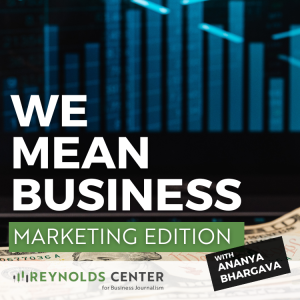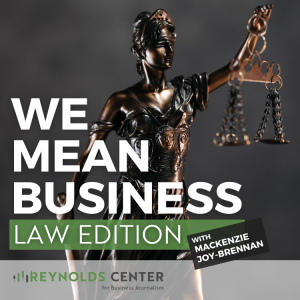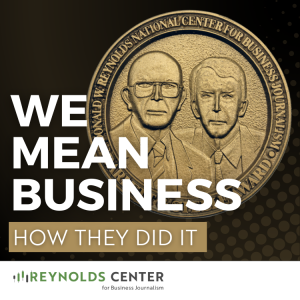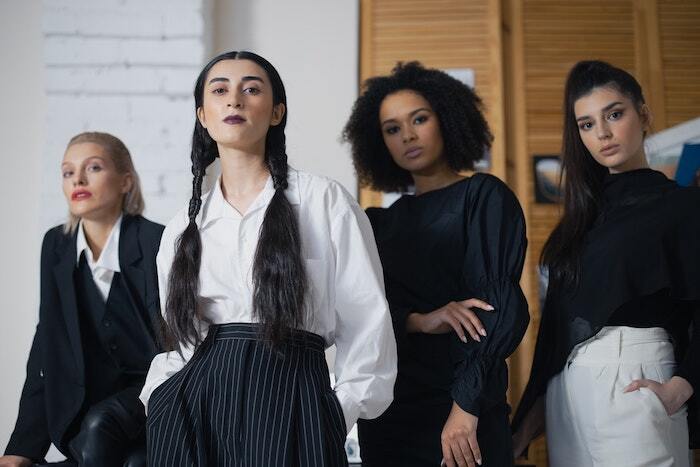We Mean Business
Originally the “How to Cover Money” podcast series, ”We Mean Business” is produced by The Reynolds Center for Business Journalism, designed specifically for journalists who want to cover business better on their beats.
Originally the “How to Cover Money” podcast series, ”We Mean Business” is produced by The Reynolds Center for Business Journalism, designed specifically for journalists who want to cover business better on their beats.
Episodes

Friday Aug 16, 2024
Emerging trends in e-commerce
Friday Aug 16, 2024
Friday Aug 16, 2024
Online shopping has brought about the slow demise of traditional retail, with many consumers relying solely on sites to shop for everything from groceries to electronics. In this episode, Ananya Bhargava interviews Zuzanna Blasco, a lead UX/UI engineer for Newfold Digital and a faculty associate who teaches e-commerce classes at Arizona State University. Blasco analyzes the impact of e-commerce on consumer behavior while also diving into emerging trends in online shopping, including AI integration, influencer marketing, social commerce, augmented and virtual reality experiences, and subscriptions.

Monday Aug 05, 2024
The legal and ethical concerns of data driven marketing in technology
Monday Aug 05, 2024
Monday Aug 05, 2024
As our reliance on technology and data systems grows, so do the avenues through which corporations can harvest our information. In this episode, Ananya Bhargava interviews Joseph Ryoo, an Assistant Professor of Marketing at Arizona State University and expert in unstructured data analysis. Dr. Ryoo describes the techniques businesses use to collect and utilize data, the differences between what is legal and what is ethical regarding consumer privacy, and how business students can navigate data-driven marketing in the future.

Friday Aug 02, 2024
The ethics of AI and data usage in marketing
Friday Aug 02, 2024
Friday Aug 02, 2024
As we witness the rising significance of data and the increasing use of AI to optimize personalized advertising, concerns regarding data acquisition and ethical usage become increasingly pressing. In this episode, Ananya Bhargava interviews Seth Rachlin, a social scientist, business leader, and entrepreneur currently active as a researcher and assistant teaching professor of Social Data Science at Arizona State University.
Dr. Rachlin discusses how social media data mining shapes targeted marketing, the moral considerations of gathering personal data, and the broader consequences of AI integration in business.

Thursday Sep 28, 2023
The movie business as a working union actor
Thursday Sep 28, 2023
Thursday Sep 28, 2023
SAG-AFTRA is still striking against the AMPTP (Alliance of Motion Picture and Television Producers - movie studios, big streaming corporations, etc.) even as the writer's union has reached its own agreement with the studios this week. In this episode, Mackenzie Joy-Brennan talked to SAG member Marie Cecile Anderson -- an actor, comedian, and musician based in Nashville -- about the strike decision, the demands union members are asking for, and what life is like as a working union actor, even while on strike.

Tuesday Sep 19, 2023
What happens when you’re not on strike, but your industry is?
Tuesday Sep 19, 2023
Tuesday Sep 19, 2023
As the entertainment industry strikes continue, Mackenzie Joy-Brennan has a chat with Hollywood costume designer Nicole Suerez Jones whose local IATSE (International Alliance of Theatrical Stage Employees) unions aren't on strike, but are still suffering the effects of the current dual strikes in Hollywood. Nicole talks studio executive greed, working conditions, artificial intelligence, and what it means to be functioning in an industry that appears to be at an impasse.

Tuesday Feb 21, 2023
Who lost this year’s Super Bowl? It could be the taxpayers.
Tuesday Feb 21, 2023
Tuesday Feb 21, 2023
The Phoenix Valley was packed with visitors for Super Bowl LVII, but does a packed city equal extra economic activity? Janaé Bradford interviews Kelly Phillips Erb, an expert on tax law who has written for and been interviewed by a variety of media outlets. She is currently a tax contributor for Forbes and a Tax Counsel for White & Williams, LLP.
Phillips Erb breaks down how local taxpayers contribute to big sporting events but may not be seeing the dividends they were promised. From tax offsets and exemptions, there are a lot of ways that sporting leagues negotiate with local districts before awarding an Olympic, World Cup, or Super Bowl bid.
To keep up with Phillips Erb's work, visit taxgirl.com and read her recent work for Forbes titled 'The Super Bowl doesn't always produce super-sized revenues for local taxpayers.'

Thursday Feb 09, 2023
Don’t shy away from the business angle in your sports coverage
Thursday Feb 09, 2023
Thursday Feb 09, 2023
When is it okay to start talking about the financial cost of a game not played? Steven Watkins, a reporter for the Cincinnati Business Courier, was reporting on the Bengals/Bills game live when Damar Hamlin was struck in the chest and halted the NFL. Watkins shares with Janaé Bradford how he reacted as a journalist who covers the business of sports at a local business journal.
Watkins has decades of experience covering the business side of sports and shares tips with aspiring sports journalists on how they can fill a much-needed role in the industry by not shying away from the financials.
View the transcript here.

Thursday Jan 26, 2023
The business of college football with Amanda Christovich
Thursday Jan 26, 2023
Thursday Jan 26, 2023
Ever wonder what it is like covering the biggest college football game of the season? Janaé Bradford invited Amanda Christovich from FrontOffice Sports to speak with her about her experience covering the business of the big game.
Covering college football isn’t just about covering the X’s and O’s. College football has become an enterprise in itself that reporters should not shy away from covering. Christovich tells us how she started covering the business of sports and how businesses have noticed the significant demand for college football. She notes that reporting on the college championship continues long after the game has been called.
Christovich covers everything from gender equity and sports labor issues to name, image, and likeness -- and was recently named one of LinkedIn's top five creators of the week for my NIL stories. Check out more by Christovich on Twitter, FrontOffice Sports, or her website.

Wednesday Nov 16, 2022
Bloomberg reporters gain answers to Cerebal Inc.’s ’Questionable Practices’
Wednesday Nov 16, 2022
Wednesday Nov 16, 2022
Janaé Bradford interviews Bloomberg reporters Caleb Melby and Polly Mosendz, two members of the bronze award-winning team for their investigation 'Questionable Practices.' Their investigation brings the first important revelations about the largest medical mental-health startup, Cerebral, and its effort to bring telemedicine techniques to mental healthcare.
Bloomberg reporters found a lack of delicate consideration assessment from the million-dollar business when prescribing medication to their patients. Listen to what the reporters had to say about what it took to make this investigation happen.

Monday Jun 27, 2022
Business journalism advice for students with Jeff Timmermans
Monday Jun 27, 2022
Monday Jun 27, 2022
For her last episode, Ruby interviews Jeff Timmermans, Director of the Reynolds Center. Ruby asks poignant questions about what is needed from students looking to get into business journalism and why students should consider the field. Jeff shares with us the importance of business journalism and how you don't need a finance background to report on and cover the business beat.

At the Reynolds Center
The Reynolds Center for Business Journalism was established in 2003 with the goal of improving the quality of media coverage of business and the economy. Since then our mission has been to promote the importance of business journalism among journalism students, give journalists tools to improve their business coverage and help freelancers navigate working with a variety of publications.
Over the years the Reynolds Center has trained more than 30,000 journalists and educators through in-person and online training throughout the country. We have worked with a wide range of freelance writers and collaborated with academic professors and departments in order to continuously improve the quality of content we produce including ebooks, podcasts, and instructional videos.



